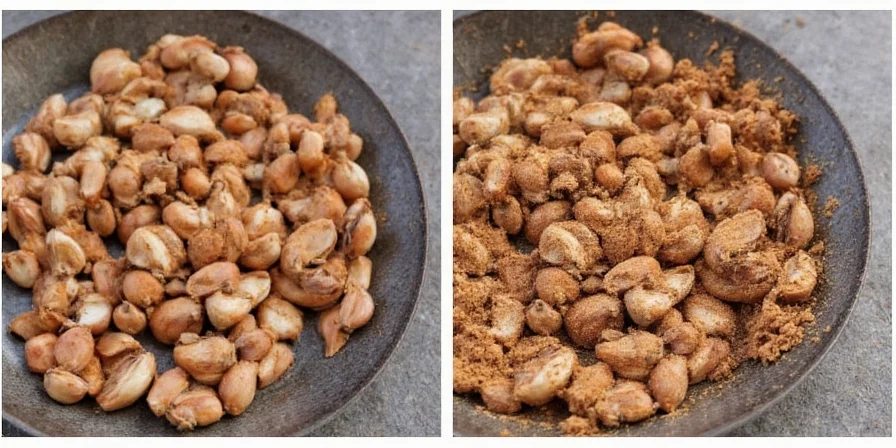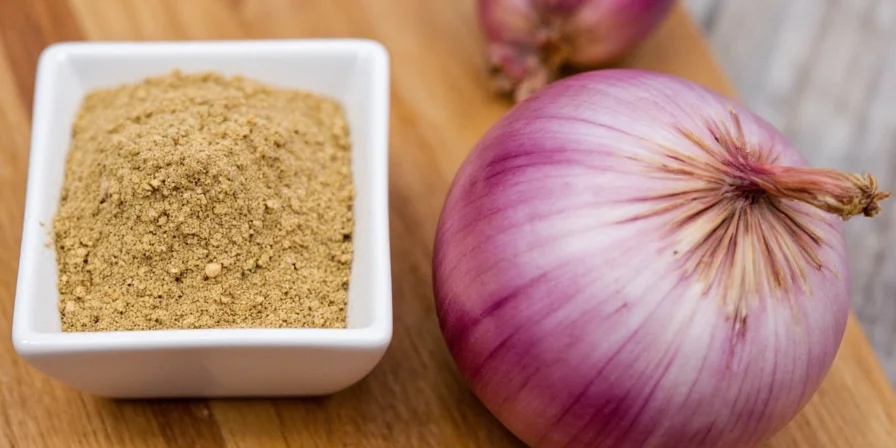From Onion to Onion Powder: Unlocking the Flavor Power in Your Kitchen

Ever found yourself staring at a half-used onion in your fridge, wondering if it's still good, or if it's better off becoming a flavor bomb in your next meal? Fear not, my fellow culinary explorers. Today, we're diving deep into the world of onion to onion powder, and how this magical transformation can elevate your cooking to new heights. Whether you're a seasoned chef or a curious home cook, this guide will give you all the tools, tips, and insights you need to master the art of storing and using onion powder like a pro.
Why Onion Powder Is a Kitchen Game-Changer
Onion powder is not just a convenient alternative to fresh onions—it's a powerhouse of flavor that can transform even the simplest dishes. Let's break down why this humble spice deserves a spot on your pantry shelf.
- Long shelf life: Unlike fresh onions, which can go bad in weeks, onion powder can last for up to two years when stored properly.
- Consistent flavor: Fresh onions can vary in taste depending on the variety and how they were stored. Onion powder, however, offers a uniform flavor that you can rely on.
- Convenience: No need to chop, mince, or worry about the onion smell lingering in your kitchen. Just sprinkle and go.
- Enhances depth of flavor: Onion powder brings a savory, umami-rich depth to dishes that fresh onions can't always achieve, especially in dry or baked recipes.
The Science Behind Onion Powder
Onion powder is made by dehydrating finely chopped onions at low temperatures, which preserves the natural flavor compounds. The primary flavor component in onions is allyl disulfide, a sulfur-containing compound responsible for the pungent aroma and sharp taste. When onions are dehydrated, these compounds become more concentrated, resulting in a more intense, yet balanced, flavor profile.
Here's a quick breakdown of the key compounds found in onion powder:
| Compound | Function | Flavor Contribution |
|---|---|---|
| Allyl Disulfide | Responsible for the sharp, pungent flavor | Strong, savory |
| Sulfur Compounds | Contribute to the umami and depth of flavor | Rich, complex |
| Furanocoumarins | Provide a slightly sweet and aromatic note | Mild, sweet |
How to Make Onion Powder at Home (Pro Tips)
While store-bought onion powder is readily available, making your own at home allows you to control the quality and flavor. Here's how to do it like a pro:
Step-by-Step Guide to Making Onion Powder
- Choose the right onions: Use yellow or red onions for the best flavor. Avoid green onions or shallots, as they have a different flavor profile.
- Clean and chop: Wash the onions thoroughly and chop them into small, uniform pieces to ensure even dehydration.
- Blanch (optional): For a more intense flavor, blanch the onions in boiling water for 30 seconds, then immediately plunge them into ice water to stop the cooking process.
- Dehydrate: Spread the onions in a single layer on a dehydrator tray or a baking sheet. Use a dehydrator set to 125°F (52°C) for 8–12 hours, or bake them in an oven at the lowest temperature (150–170°F or 65–75°C) for 6–8 hours, until completely dry and crisp.
- Grind and store: Once fully dehydrated, grind the onions into a fine powder using a food processor or spice grinder. Store in an airtight container in a cool, dark place.
Pro tip: For a more intense flavor, add a pinch of salt during the dehydration process. Salt helps draw out moisture and enhances the savory notes in the onion powder.
Onion Powder Storage Hacks: Keep It Fresh and Flavorful
Even the best onion powder can lose its potency if not stored properly. Here are some tried-and-true storage hacks to keep your onion powder in peak condition:
1. Airtight Containers Are Your Best Friend
Onion powder is highly sensitive to moisture and air. To preserve its flavor and texture, store it in airtight containers made of glass or food-grade plastic. Avoid using containers that are not sealed properly, as exposure to air can cause the powder to clump and lose its potency.
2. Cool and Dark Is Ideal
Heat and light can degrade the flavor compounds in onion powder. Store your powder in a cool, dark place such as a pantry or cabinet. Avoid storing it near the stove or in direct sunlight.
3. Use Desiccant Packets
To absorb any residual moisture, place a desiccant packet (like those used for storing electronics) inside the container. These packets help maintain a dry environment, preventing clumping and extending shelf life.
4. Portion Control for Easy Use
To avoid overusing onion powder and to maintain freshness, portion it out into smaller containers. This way, you can use only what you need without exposing the rest to air and moisture.
5. Label and Date
Even the best spice can lose its potency over time. Always label your containers with the date you made or purchased the powder. This helps you keep track of how old it is and when it's best to use it before it starts to lose its flavor.
Onion Powder Usage: When and How to Use It
Now that we've covered storage, let's dive into the fun part: using onion powder. Here's how to make the most of this versatile spice in your cooking:
1. Use in Dry Rubs and Marinades
Onion powder is a fantastic addition to dry rubs for meats, especially when combined with garlic powder, paprika, and cumin. It adds a savory, umami-rich layer that enhances the flavor of grilled or roasted meats.
2. Add to Baked Goods
Onion powder is a great secret ingredient in baked goods like bread, muffins, and even cookies. It adds a subtle depth of flavor that can elevate even the simplest recipes.
3. Use in Soups and Stews
While fresh onions are often used as a base in soups and stews, onion powder can be used to add a more concentrated flavor. Just a teaspoon can make a noticeable difference in the depth of flavor.
4. Enhance Sauces and Dips
Onion powder can be used to enhance the flavor of sauces like gravies, mayonnaise, and aioli. It adds a savory kick that pairs well with both sweet and savory dishes.
5. Use in Spices Blends
Onion powder is a key component in many spice blends, including garam masala, harissa, and even some versions of Italian seasoning. It adds a subtle but important depth that can't be replicated by other spices alone.
Onion Powder vs. Garlic Powder: A Flavor Showdown
While both onion and garlic powders are commonly used in cooking, they have distinct flavor profiles that make them suitable for different applications. Here's a quick comparison to help you choose which one is right for your recipe:
| Characteristic | Onion Powder | Garlic Powder |
|---|---|---|
| Flavor Profile | Savory, umami-rich, slightly sweet | Pungent, sharp, slightly bitter |
| Best For | Dry rubs, soups, stews, baked goods | Garlic-based sauces, marinades, roasted vegetables |
| Shelf Life | Up to 2 years | Up to 2 years |
| Usage Tips | Use in small amounts to avoid overpowering the dish | Use in small amounts, but it's more potent and can be overpowering if used too much |
As you can see, both onion and garlic powders have their place in the kitchen, but they serve different purposes. Understanding their unique flavor profiles can help you make better flavor choices in your cooking.
Common Mistakes to Avoid When Using Onion Powder
Even the most experienced cooks can fall into the trap of using onion powder incorrectly. Here are some common mistakes to avoid:
- Using too much: Onion powder is potent, and a little goes a long way. Start with a small amount and adjust to taste.
- Using it in wet dishes: Onion powder is best used in dry or semi-dry dishes. In wet dishes, it can dissolve and become less effective. For wet dishes, it's better to use fresh onions or onion puree.
- Storing it in the fridge or freezer: While it's not harmful, storing onion powder in the fridge or freezer is unnecessary and can cause it to absorb moisture from the air.
- Using expired powder: Old onion powder can lose its potency and flavor. Always check the date before using.
Onion Powder in Global Cuisines: A Flavorful Journey
Onion powder isn't just a Western kitchen staple—it's a key ingredient in many global cuisines. Here's a quick look at how different cultures use onion powder:
1. Indian Cuisine
In Indian cooking, onion powder is often used in spice blends like garam masala and chaat masala. It adds a savory depth to curries, chutneys, and even fried snacks like samosas.
2. Middle Eastern Cuisine
In Middle Eastern cooking, onion powder is used in spice blends like za'atar and in dishes like hummus and falafel. It adds a subtle umami flavor that complements the other ingredients.
3. Italian Cuisine
Italian cooks often use onion powder in dry rubs for meats, in tomato-based sauces, and in bread recipes. It adds a subtle depth that enhances the flavor of pasta dishes.
4. Mexican Cuisine
In Mexican cooking, onion powder is used in dry rubs for tacos and fajitas, in salsas, and in spice blends like adobo. It adds a savory kick that complements the other flavors in the dish.
As you can see, onion powder is a versatile ingredient that can be found in cuisines all over the world. Its ability to enhance the flavor of dishes without overpowering them makes it a favorite among chefs and home cooks alike.
Final Thoughts: Embrace the Power of Onion Powder
Onion powder is more than just a convenient substitute for fresh onions—it's a powerful flavor enhancer that can elevate your cooking to new heights. Whether you're making a dry rub for your next BBQ or adding a subtle depth to your baked goods, onion powder is a must-have in your spice cabinet.
By storing it properly and using it wisely, you can ensure that your onion powder stays fresh, flavorful, and ready to use whenever you need it. So go ahead—grab that jar of onion powder and let your kitchen come alive with flavor!

Now it's your turn—what's your favorite way to use onion powder in your cooking? Share your tips and tricks in the comments below, and don't forget to tag a fellow spice lover in your next culinary adventure!
Happy cooking, and may your dishes be forever infused with the magic of onion powder.










 浙公网安备
33010002000092号
浙公网安备
33010002000092号 浙B2-20120091-4
浙B2-20120091-4